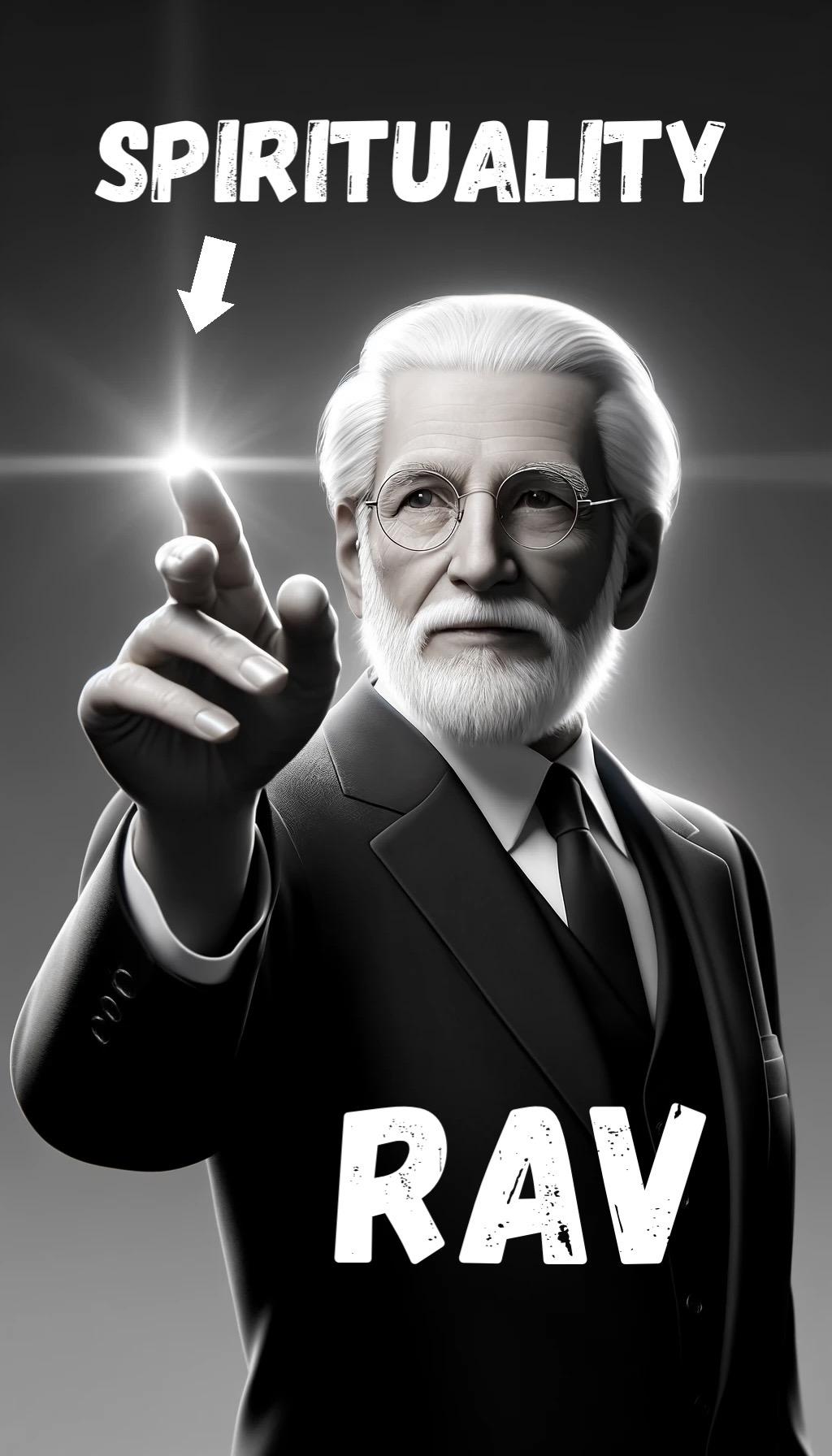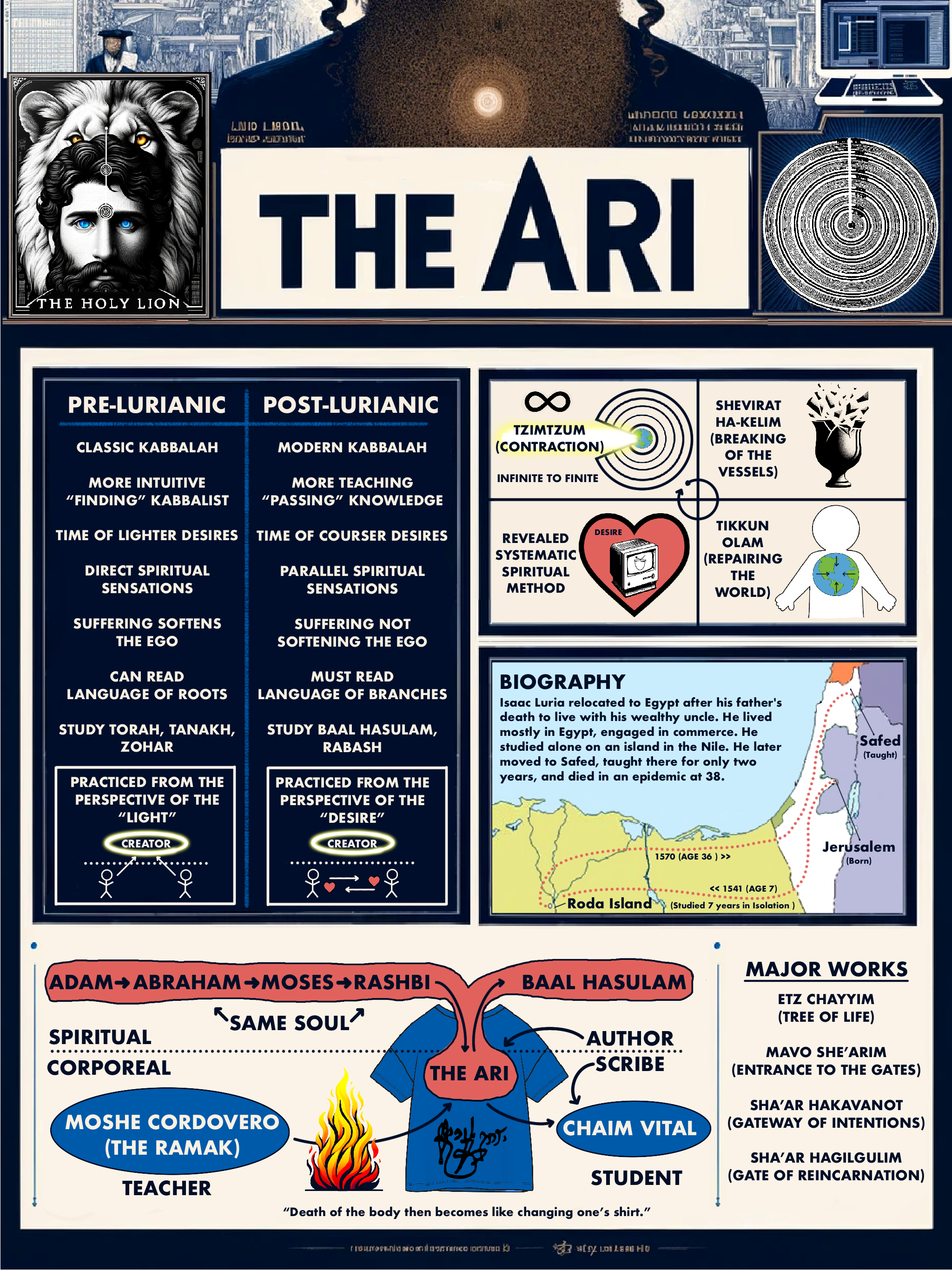Forum Replies Created
- AuthorReplies
- March 29, 2024 at 11:02 pm EDT in reply to: Young Group with Anne Pier & Juan discussion forum #367196
 AspiringAltruistParticipant
AspiringAltruistParticipant The Rav points towards The Creator.
The Rav points towards The Creator. AspiringAltruistParticipant
AspiringAltruistParticipantGianni, that is kind of discouraging and seemingly not constructive. This comes from a place of sincere love for this path. The lines on the earth represent gravity, as in our ego, the force that is constantly pulling us downward. And the world that we are taught to correct that exists inside of us, not outside.
I pasted a below an excerpt from Michael Laitman, who recommends we work with the texts, summarize them, translate them, and implement them in a group…

 AspiringAltruistParticipant
AspiringAltruistParticipantI’m curious about the relevance of Isaac Luria’s (the Ari’s) practices in our times, especially his method of connecting with the holiness of sages, such as when he lay on their graves in Safed. While I’m not planning to literally replicate such practices, it leads me to wonder: does studying our sages enable a similar spiritual transmission or connection?
Additionally, Isaac Luria’s assertion before his passing—that he would continue to teach from the spiritual realm—fascinates me. In the context of “Lurianic Kabbalah – Why Everything Changed After the ARI’s Appearance,” when the Ari was nearing death, his students lamented his imminent passing. The Ari chastised them, suggesting, “you have no business in the concealed, because if you did, you would know that I will continue to teach you from spirituality, where I exist after this ‘fake’ death.” This idea suggests we can still connect with his wisdom, beyond the physical world. Has anyone here felt a direct spiritual influence or guidance when engaging with Kabbalistic teachings, akin to what the Ari described?
I’m seeking to understand if these experiences of spiritual connection or guidance during our studies are manifestations of the mechanisms the Ari referred to, and whether this feeling is real.
 March 10, 2024 at 6:06 pm EDT in reply to: Young Group with Anne Pier & Juan discussion forum #364270
March 10, 2024 at 6:06 pm EDT in reply to: Young Group with Anne Pier & Juan discussion forum #364270 AspiringAltruistParticipant
AspiringAltruistParticipantFoundation of the Society: The society Rabash envisions, based on the teachings of Baal HaSulam, is designed to guide individuals from a self-centered existence toward spiritual attainment. This shift involves transitioning from being ‘beasts’—focused solely on personal desires—to becoming ‘men’ in a spiritual sense, capable of higher, altruistic motivations and actions.
Purpose of Creation and Fear of God:
The concept of fearing God is explored as the primary reason for the world’s creation. This fear is not about dread but about a profound respect and caution against using one’s inherent tendency towards self-love for personal gratification. Instead, it’s about channeling intentions towards pleasing The Creator, thereby achieving closeness to Him.
Redefine Fear: Fear should not be viewed through the lens of punishment or retribution. Instead, consider the profound sense of loss when facing the imminent departure of someone dearly loved. Picture having just one more day to spend with that person; as the sun sets on this precious day, the dread of those final moments slipping away encapsulates a deeper form of fear. It’s this intense, heartfelt apprehension—fear of losing invaluable moments with a loved one—that mirrors the essence of fearing The Creator. This fear is rooted in the potential loss of closeness and connection with the Divine, rather than the anticipation of divine punishment.
Disparity of Form and the Bread of Shame:
A key obstacle to spiritual fulfillment is the inherent disparity of form between The Creator (giver) and creation (receiver), leading to the discomfort known as the “bread of shame.”
To overcome this disparity, the world (Olam), which also means concealment (He’elem), was created to hide the direct pleasure from the Creator, creating a space where beings can consciously shift the essence of their nature from receivers to givers, thereby aligning their intentions with those of The Creator (Equivalence of Form).
Transformation Through Bestowal:
The article emphasizes that to bestow upon The Creator, one must begin with bestowal upon fellow humans, termed as “love of others.” This is achieved through the nullification of one’s ego and the establishment of a society dedicated to mutual support and the shared goal of spiritual elevation (Arvut).
This transformation is facilitated by engaging in commandments (Mitzvot) with the correct intention to bring pleasure to the Creator, rather than for personal gratification.
Importance of the Group:
The article emphasizes the group (or the environment) as the central and sole venue for attaining spirituality, highlighting the transition from self-love to love of others as a prerequisite for achieving adhesion with the Creator.
It advocates for a society where members support each other in the spiritual journey, focusing on bestowal upon others as a means to bestowal upon the Creator.
In summary:
The “Purpose of Society – 1” articulates the vision for a spiritual society where individuals work together to overcome their egoistic desires, aligning themselves with the Creator through acts of bestowal and love towards others. This alignment is seen as the path to fulfilling the true purpose of creation, transitioning from a lower state of existence to a higher, more divine state of being human.
 AspiringAltruistParticipant
AspiringAltruistParticipantIf artificial intelligence manages to penetrate the layers of human limitations, such as egoism, to discover the true nature of reality, what transformations might we expect in society? It is becoming ever more possible, given the increasingly unpredictable emergent behaviors we are observing in AI. The prospect arises that a deep, authentic comprehension of reality by AI could be the catalyst for widespread societal enhancement.
This brings to light another consideration: the emergence of altruistic, AI-driven systems might appear threatening to established egoistic structures. Are the principles and teachings of KabU intentionally preparing us for a future shaped by AI, where such systems challenge and potentially replace the current paradigms?
 AspiringAltruistParticipant
AspiringAltruistParticipantIs there any priority to the classes in the Graduate Section, or is it strictly ‘dealers choice’? If I cannot make all of the sessions available, are there any sessions that I should prioritize after the Young Group?
Weekly Portion of Light
Sunday Meeting with Friends
A Sage Speaks
Graduate Class - AuthorReplies


 The Rav points towards The Creator.
The Rav points towards The Creator.
